|
Books Should Be Free Loyal Books Free Public Domain Audiobooks & eBook Downloads |
|
|
Books Should Be Free Loyal Books Free Public Domain Audiobooks & eBook Downloads |
|
Top Authors |
|---|
|
Book type:
Sort by:
|
By: David Lindsay (1876-1945) | |
|---|---|
 A Voyage to Arcturus
A Voyage to Arcturus
A Voyage to Arcturus is a novel by Scottish writer David Lindsay, first published in 1920. It combines fantasy, philosophy, and science fiction in an exploration of the nature of good and evil and their relationship with existence. It has been described by critic and philosopher Colin Wilson as the "greatest novel of the twentieth century" and was a central influence on C. S. Lewis's Space Trilogy. | |
By: Mary Webb (1881-1927) | |
|---|---|
 Gone To Earth
Gone To Earth
“Gone to Earth” is the cry of fox hunters as the fox takes to its den and they lose the chase. Here, Mary Webb tells the story of Hazel Woodus whose understanding of her half tame fox cub contrasts with her misunderstanding of humanity. She is pursued by two very different men, a Gentleman Farmer and the local Minister. Mary Webb’s writing is sometimes compared to that of Thomas Hardy, her descriptions of nature are vivid and her view of love and life is touched with tragedy. She wrote this book in 1917 and it is set in the borderlands of rural Shropshire. | |
By: Théophile Gautier (1811-1872) | |
|---|---|
 Clarimonde
Clarimonde
Original title “La Morte Amoreuse.” This is the story of a priest named Romauld, and his all-consuming love for the beautiful courtesan, Clarimonde. | |
 Romance of a Mummy and Egypt
Romance of a Mummy and Egypt
MANUAL OF SURGERY, OXFORD MEDICAL PUBLICATIONSBY ALEXIS THOMSON, F.R.C.S.Ed.PREFACE TO SIXTH EDITION Much has happened since this Manual was last revised, and many surgical lessons have been learned in the hard school of war. Some may yet have to be unlearned, and others have but little bearing on the problems presented to the civilian surgeon. Save in its broadest principles, the surgery of warfare is a thing apart from the general surgery of civil life, and the exhaustive literature now available on every aspect of it makes it unnecessary that it should receive detailed consideration in a manual for students... | |
By: Frederic Bastiat | |
|---|---|
 Essays on Political Economy
Essays on Political Economy
Bastiat asserted that the only purpose of government is to defend the right of an individual to life, liberty, and property. From this definition, Bastiat concluded that the law cannot defend life, liberty and property if it promotes socialist policies inherently opposed to these very things. In this way, he says, the law is perverted and turned against the thing it is supposed to defend. | |
By: Susan Warner (1819-1885) | |
|---|---|
 The Wide, Wide World
The Wide, Wide World
“How should a seven year old child react when forced to be separated from a mother who meant everything to her? How should she react when she learns that the aunt with whom she was sent to live doesn’t really care about her? Will she be able to make real friendships with people outside her family? Would she be able to take her belief in God as a comfort? If you want to find answers to all these questions, read the enjoyable novel “The Wide, Wide World”. There, you will see how the amazing Ellen Montgomery reacts to all those things, and many, many more”. | |
 Queechy
Queechy
Fleda Ringan is an 11 year old orphan who lives with her grandfather in Queechy, Vermont. After a tragic incident, Fleda has to live with her aunt in Paris, Mrs. Rossiter. She travels to Paris under the care of young Mr. Carleton and his mother, a rich Englishwomen. Every young man who meets Fleda loves her, but she adores only Mr. Carleton. Once Fleda's aunt Mrs. Rossiter looses all her money, they return to America where Fleda learns to farm and cook to support her family. Mr. Carleton is always around to help out but never utters a word about love to Fleda. | |
 Nobody
Nobody
There are many romantic tales about a handsome and rich man falling in love with a beautiful lower class woman over the objections of his family. Remember Elizabeth Bennett and Fitzwilliam Darcy? however, it takes more than a good woman to secure a man's happiness. He has to have mental strength. It is not certain that our hero, Tom, has that. Lois is a great woman. However, according to his sister, she is a "nobody." Does money and position control everything? Certainly not. Good people deserve to be happy... | |
By: Mrs. Eugenia Dunlap Potts (1840-1912) | |
|---|---|
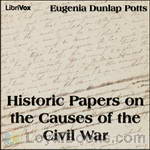 Historic Papers on the Causes of the Civil War
Historic Papers on the Causes of the Civil War
While claiming to be historical papers on the causes of the United States Civil War, the author indulges in some Slavery Apologetics. An interesting view from a southern lady on what caused the war and why the south was the underdog. | |
By: Charles Baudelaire (1821-1867) | |
|---|---|
 Flowers of Evil
Flowers of Evil
This is a collection of French poems by Charles Baudelaire, originally titled "Les Fleurs du mal." It was popular in the symbolist and modernist movements of the 19th century, and the poems are about decadence and eroticism. | |
By: Earle Ashley Walcott (1859-1931) | |
|---|---|
 Blindfolded
Blindfolded
Giles Dudley is called upon by his cousin Henry Wilton to assist him in San Francisco, but the reason for the summons is not at all clear. Dudley answers the summons, only to find himself immediately wrapped in the middle of mystery and intrigue, the roots and ends of which he is utterly unaware. He has been given to care for a mysterious young boy whom he hasn't even seen. His cousin has mysteriously disappeared. Dudley's role in the mystery has him convinced that as he goes about trying to assist his cousin with whatever it was he wanted to accomplish, he does so completely blindfolded. | |
By: Thornton W. Burgess (1874-1965) | |
|---|---|
 The Adventures of Mr. Mocker
The Adventures of Mr. Mocker
When an innocent blue jay starts talking in his sleep, it’s up to him to find out what’s going on in this fun, naturalistic, Southern-style children’s story. | |
 The Adventures of Jerry Muskrat
The Adventures of Jerry Muskrat
Join us as we follow Jerry Muskrat and his friends on an adventure to discover what is threatening their homeland; The Laughing Brook and The Smiling Pool. | |
 Mrs. Peter Rabbit
Mrs. Peter Rabbit
A wonderful book in which we meet the lucky little bunny who becomes Mrs. Peter Rabbit! This is one of many delightful animal books written by Thornton W. Burgess. I grew up reading and enjoying these tales of talking animals with fun and varied personalities. Peter Rabbit is a character loved by all, and this charming tale recounts the adventures of meeting, wooing, and marrying Mrs. Peter Rabbit. (Introduction by CLW Rollins) | |
 Adventures of Grandfather Frog
Adventures of Grandfather Frog
Longlegs the Blue Heron felt decidedly out of sorts. It was a beautiful morning, too beautiful for any one to be feeling that way. Indeed, it was the same beautiful morning in which Grandfather Frog had caught so many foolish green flies. Jolly, round, bright Mr. Sun was smiling his broadest. The Merry Little Breezes of Old Mother West Wind were dancing happily here and there over the Green Meadows, looking for some good turn to do for others. The little feathered people to whom Old Mother Nature has given the great blessing of music in their throats were pouring out their sweetest songs... | |
 Adventures of Old Mr. Toad
Adventures of Old Mr. Toad
The Adventures of Old Mr. Toad is another in the long line of children's books by conservationist Thornton W. Burgess. In this book, we follow the adventures of Old Mr. Toad as he joins the Spring Chorus at the Smiling Pool, shows off his babies, displays his special tongue to Peter Rabbit and has a very special encounter with Buster Bear. We also learn little lessons about life such as pride can burst like a great big bubble, your friends' hidden talents may surprise you and it is considered impolite to watch someone change his clothes - especially when he eats them. | |
 Adventures of Danny Meadow Mouse (dramatic reading)
Adventures of Danny Meadow Mouse (dramatic reading)
Danny begins his tale regretting the length of his tail until he is corrected by Mr. Toad. Then he has a series of stalkings by Reddy and Granny Fox. He is captured by Hooty the Owl and escapes mid-flight to Peter Rabbit's briar patch. Peter goes to Farmer Brown's peach orchard and gets caught in a snare and barely escapes himself. Finally Danny gets trapped in a tin can and must use his wits to escape Reddy Fox again. | |
 Adventures of Lightfoot the Deer
Adventures of Lightfoot the Deer
The Adventures of Lightfoot the Deer is another set of children’s stories by the conservationist, Thornton W. Burgess. More serious than some of Burgess' other children's books, much of this book chronicles the tense predator-prey relationship of a human hunter and Lightfoot the Deer during the autumn hunting season. Later, Lightfoot discovers a hunt of a different kind. | |
 Adventures of Prickly Porky
Adventures of Prickly Porky
A stranger from the North Woods has just arrived in the Green Forest causing a great stir among the woodland creatures who live there. They quickly discover that this odd fellow with the barbed spikes in his fur is the loyal and brave Prickly Porky the Porcupine. Not long after Prickly Porky arrives, a bit of early morning fun leads to a forest mystery that draws friends and foes alike into the investigation of an unknown headless, tailless, whirling creature seen only at sunrise on the hill by Prickly Porky's home... | |
 Mother West Wind "How" Stories
Mother West Wind "How" Stories
Peter Rabbit has many questions. How did Howler the Wolf get his name? How did Lightfoot the Deer learn to jump? How did Drummer the Woodpecker come by his red cap? When Peter asks Grandfather Frog, Grandfather Frog tells him a story of long ago. This book is a collection of those stories told by Grandfather Frog and many others. | |
 Old Granny Fox
Old Granny Fox
Old Granny Fox and grandson Reddy Fox must use all their cunning to hunt up enough food to survive the long winter. Food in the Green Meadow is scarce but Farmer Brown's hens are locked up tight and protected by Bowser the Hound, so Granny takes a conceited Reddy hunting and teaches him some surprising new tricks to lure in their dinner. Old Granny and Reddy Fox encounter danger and adventure in their quests to keep their bellies full, including a close encounter with Farmer Brown's boy, a clever plot to steal Bowser's food, and an unforeseen thief who might outsmart this sneaky pair. | |
 Adventures of Poor Mrs. Quack
Adventures of Poor Mrs. Quack
"Hello, Jerry Muskrat! We'd forgotten all about you," said Mrs. Quack. "What was that you said?" Jerry good-naturedly repeated what he had said. Mrs. Quack's face brightened. "Do you really mean it?" she asked eagerly. "Do you really mean that you know of a pond where we could live and not be likely to be seen by these two-legged creatures called men?" "That's what I said," replied Jerry briefly. "Oh, Jerry, you're not joking, are you? Tell me you're not joking," begged Mrs. Quack. "Of course I'm not joking," returned Jerry just a little bit indignantly, "I am not the kind of a fellow to joke people who are in such trouble as you and Mr. Quack seem to be in." | |
 Adventures of Unc' Billy Possum
Adventures of Unc' Billy Possum
Another short story for children by the well-known conversationalist and writer, Thornton W. Burgess. This story revolves around Unc' Billy Possum and his adventures. | |
 Blacky the Crow
Blacky the Crow
Blacky the Crow is a clever rascal who lives in the Green Forest and Meadow. He loves to play tricks on the other little people who are his neighbours, and is curious about Farmer Brown’s Boy. Blacky is always thinking about what is right and what is wrong, but he still gets into all kinds of mischief. | |
 Bowser the Hound
Bowser the Hound
Old Man Coyote craftily leads Bowser the hound away from home, and Bowser gets lost. Will Bowser find his way back to Farmer Brown's? Will Reddy Fox finally catch himself a chicken, now that Bowser is no longer guarding the henhouse? This is one of many delightful books by the naturalist Thornton W. Burgess, who wrote children's stories featuring the animals of the Green Forest and the Green Meadows. | |
 Happy Jack
Happy Jack
The adventures and perils of Happy Jack the Squirrel in the Green Forest, co-starring Happy Jack's cousins Chatterer the Red Squirrel and Striped Chipmunk, friends Sammy Jay, Tommy Tit, Whitefoot the Wood Mouse, and Shadow the Weasel as Happy Jack's enemy. | |
By: Isabella Matilda Davis Brittingham (1852-1924) | |
|---|---|
 The Revelation of Baha-ullah in a Sequence of Four Lessons
The Revelation of Baha-ullah in a Sequence of Four Lessons
Isabella Matilda Davis Brittingham was a significant early American Bahá’í and was posthumously designated by Shoghi Effendi as one of the 19 Disciples of ‘Abdu’l-Bahá and Heralds of the Covenant. She was born in 1852, the daughter of Benjamin Davis, who was a grandson of John Morton, a signer of the Declaration of Independence. Her sister-in-law heard about the Bahá’í Faith in 1897 and in 1898 Isabella herself became a part of the nascent American Bahá’í community. In September 1901, Isabella went on pilgrimage to the Holy Land, where she met ‘Abdu’l-Bahá, the leader of the Bahá’í Faith and son of the Founder, Bahá’u'lláh... | |
By: Ellen White (1827-1915) | |
|---|---|
 Steps to Christ
Steps to Christ
Ellen Gould White (1827 – 1915) was a prolific Christian writer, authoring 40 books in her lifetime. She was active in the Millerite movement, and was one of the principle founders of the Seventh Day Adventist Church.Steps to Christ, first published in 1892, is her most popular book. It has been translated into more than 70 languages. The theme of the book is how to come to know Christ better. | |
By: Ulysses S. Grant (1822-1885) | |
|---|---|
 Personal Memoirs of U. S. Grant
Personal Memoirs of U. S. Grant
"In preparing these volumes for the public, I have entered upon the task with the sincere desire to avoid doing injustice to any one, whether on the National or Confederate side, other than the unavoidable injustice of not making mention often where special mention is due. There must be many errors of omission in this work, because the subject is too large to be treated of in two volumes in such way as to do justice to all the officers and men engaged. There were thousands of instances, during the rebellion, of individual, company, regimental and brigade deeds of heroism which deserve special mention and are not here alluded to... | |
 Letters of Ulysses S. Grant to His Father and His Youngest Sister
Letters of Ulysses S. Grant to His Father and His Youngest Sister
Among the national leaders whose names will always hold an honorable place in American history is Ulysses S. Grant, the simple-hearted man and capable soldier, to whose patriotism, courage, persistence, and skill was so largely due the successful termination of the war between the States, the contest which assured the foundations of the Republic. We are interested not only in learning what this man did, but in coming to know, as far as may be practicable, what manner of man he was. It is all-important in a study of development of character to have placed within reach the utterances of the man himself... | |
By: L. L. Langstroth (1810-1895) | |
|---|---|
 Langstroth on the Hive and the Honey-Bee
Langstroth on the Hive and the Honey-Bee
Langstroth revolutionized the beekeeping industry by using bee space in his top opened hive. In the summer of 1851 he found that, by leaving an even, approximately bee-sized space between the top of the frames holding the honeycomb and the flat coverboard lying above, he was able to quite easily remove the latter, which was normally well cemented to the frames with propolis making separation hard to achieve. Later he had the idea to use this discovery to make the frames themselves easily removable... | |
By: Mrs Charles Bryce (1839-1920) | |
|---|---|
 The Ashiel Mystery - A Detective Story
The Ashiel Mystery - A Detective Story
Just as the adopted Juliet Byrne finds out the truth about her family, her father is murdered. Luckily the brilliant chocolate-munching Detective Gimblet takes up the case to solve the 'Ashiel Mystery' | |
By: Robert Gordon Anderson | |
|---|---|
 Seven O'Clock Stories
Seven O'Clock Stories
“Not once upon a time but just now, in a white house by the side of a road, live three happy children.Their mother and father gave them very odd names, for two old uncles and one aunt, which pleased the old people very much. Their names are all written in the big family Bible,–Jehosophat Green, Marmaduke Green, and Hepzebiah Green.” So begins this collection of bedtime stories for children, one each night for twenty days, involving these three happy children and their playmates. | |
By: Joseph Sheridan LeFanu | |
|---|---|
 Uncle Silas
Uncle Silas
Uncle Silas is a Victorian Gothic mystery/thriller novel by the Anglo-Irish writer J. Sheridan Le Fanu. It is notable as one of the earliest examples of the locked room mystery subgenre. It is not a novel of the supernatural (despite a few creepily ambiguous touches), but does show a strong interest in the occult and in the ideas of Swedenborg. | |
By: Pansy aka Isabella Alden (1841-1930) | |
|---|---|
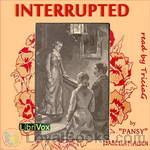 Interrupted
Interrupted
Alternately titled Out in the World. Claire Benedict is a capable, responsible, solid young Christian woman. Everyone leans on her for support and depends on her to do much that needs to be done in her church and social circle. But then her businessman father dies unexpectedly and leaves the family almost penniless, interrupting her tranquil, fulfilling life. Written by Isabella Alden under the pen name Pansy. | |
 Workers Together, or, An Endless Chain
Workers Together, or, An Endless Chain
Sixth in the Chautauqua Girls series. It picks up the characters of Dr. Stuart Everett and Joy Saunders introduced in "Ester Ried Yet Speaking" and follows them and other Christians in their work for the Master. Half-hearted and fully committed workers: all have an impact on those around them, for good or for ill. | |
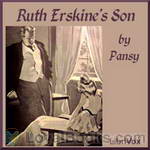 Ruth Erskine's Son
Ruth Erskine's Son
Seventh book in the Chautauqua Girls series. Written by Isabella Alden under the pseudonym “Pansy.”Erskine, Ruth's son (a 5-year-old at the end of Judge Burnham’s Daughters) is now a grown man, and Ruth is 50-something. He brings home an American wife from Paris, a woman who seems to want to tear apart mother and son. But Irene has some big secrets to hide. | |
By: William J. Burns (1861-1932) | |
|---|---|
 The Crevice
The Crevice
The sudden death of wealthy and prominent financier, Pennington Lawton from an apparent heart attack, followed by the shocking revelation of his impending bankruptcy, leaves his sole heir and only daughter, Anita, distraught and nearly penniless. Nonetheless, she is determined to unravel the mystery surrounding her father’s death and the loss of his great fortune. To this end she engages the famous detective, Henry Blaine who is determined to unravel the tangled web of deception and restore both her father’s reputation and Anita’s inheritance... | |
By: May Agnes Fleming (1840-1880) | |
|---|---|
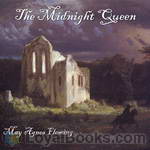 The Midnight Queen
The Midnight Queen
May Agnes Fleming is renowned as Canada's first best-selling novelist. She wrote 42 novels, many of which have only been published posthumely.The Midnight Queen is set in London, in the year of the plague 1665. Sir Norman Kingsley visits the soothsayer "La Masque" who shows him the vision of a beautiful young lady. Falling madly in love with her, he is astonished to find her only a short time later and saves her from being buried alive. He takes her home to care for her, but while he fetches a doctor, she disappears. Sir Kingsley and his friend Ormistan embark on an adventure to solve the mystery of the young lady - will they ever find her again? | |
By: F. Anstey (1856-1934) | |
|---|---|
 The Brass Bottle
The Brass Bottle
What happens when a not-so-lucky man happens upon a brass bottle and releases the djinni caught within? Misunderstanding, culture shock, hilarity, among other things. Will the well-intentioned djinni help his new master? Or will he make things even worse? | |
 Vice Versa
Vice Versa
Set in Victorian times, the novel concerns business man Paul Bultitude and his son Dick. Dick is about to leave home for a boarding school which is ruled by the cane wielding headmaster Dr. Grimstone. Bultitude, seeing his son's fear of going to the school, foolishly says that schooldays are the best years of a boy's life, and how he wished that he was the one so doing. At this point, thanks to a handy magic stone brought by an uncle from India which grants the possessor one wish, they are now on even terms... | |
By: Anstey, F. (1856-1934) | |
|---|---|
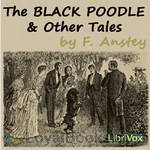 The Black Poodle and Other Tales
The Black Poodle and Other Tales
This is a collection of ten humorous short stories | |
By: F. Anstey (1856-1934) | |
|---|---|
 Baboo Jabberjee, B.A.
Baboo Jabberjee, B.A.
Another delightful example of an English writer poking fun at his countrymen, or maybe all races' reactions to someone from a diferent background. A series of adventures of a well educated foreigner in London which originally appeared weekly in Punch, sometimes with illustrations, dealing with the difficulties of fully understanding a different culture. The hero's perfect English reminds one of a quote from "My Fair Lady" ..."His English is too good, he said, "that clearly indicates that he is Foreign. Whereas other people are instructed in their native language English people aren't." | |
 Talking Horse And Other Stories
Talking Horse And Other Stories
A collection of short stories by famed humorist and Punch magazine staff member, F. Anstey, pseudonym for Thomas Anstey Guthrie. They range from humorous and whimsical to haunting and thought-provoking. | |
 Tinted Venus
Tinted Venus
When a young newly engaged man finds himself bound for an amusement garden with an old flame, not his fiancee, it is not surprising that he still feels some attraction for her. When they escape the heat of the dance floor to walk among the trees in the garden, it is not surprising that they should come upon a statue of a woman of uncommon beauty, with the smallest hands. When the young man attempts to demonstrate that his absent fiancee has hands even smaller than this immortalized stone woman, it is surprising when the engagement ring he is carrying fits easily on the stone finger, but does not easily come off... | |
 Mr. Punch's Pocket Ibsen
Mr. Punch's Pocket Ibsen
| |
 In Brief Authority
In Brief Authority
Satiric comedy from 1915 about a nouveau riche British family and their nanny who get whisked off to Maerchenland ('the land of Fairy Tales') one evening in a car drawn by storks. The matron of the family, a thorough snob, is crowned Queen of the country by mistake. She is quick to accept her new position and is determined to introduce British social niceties in her realm. And this really is the land of Fairy Tales, with gnomes, giants, a dragon, magic, a fairy godmother and more. Trouble quickly starts to brew as the royal couple and their son introduce things like capitalism and golf... | |
By: Frank Norris (1870-1902) | |
|---|---|
 McTeague
McTeague
McTeague is a simple dentist who becomes infatuated with Trina, the cousin of his friend Marcus. Trina then buys a winning lottery ticket worth $5,000, and McTeague announces his plans to marry her. But their marriage quickly falls apart as greed consumes them both, and Marcus' jealousy toward McTeague boils over. | |
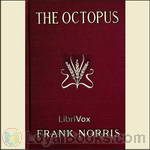 The Octopus
The Octopus
Frank Norris based his 1901 novel The Octopus (A Story of California) on the Mussel Slough Tragedy of 1880, a bloody conflict between ranchers and agents of the Southern Pacific Railroad. The central issue was over the ownership of the ranches, which the farmers had leased from the railroad nearly ten years earlier with intentions of eventually purchasing the land. Although originally priced at $2.50 to $5 per acre, the railroad eventually opened the land for sale at prices adjusted for land improvements; the railroad’s attempts to take possession of the land led the ranchers to defend themselves as depicted in the book. | |
 Vandover and the Brute
Vandover and the Brute
Vandover is a student who succumbs to a gambling addiction. This addiction causes him to divest himself of his cherished possessions and to lose his status in life, whilst his friends prosper. Eventually he is transformed by a strange degenerative lycanthropy, reduced to running back and forth across his apartment, naked, on all-fours. The novel was Norris' first, though published posthumously. Characteristically, it explores the themes of habit and addiction in a heightened "naturalistic" style. | |
By: William John Locke (1863-1930) | |
|---|---|
 The Red Planet
The Red Planet
Set during WWI in England, The Red Planet is a rich tale about the life in a little English town from the point of view of Major Duncan Meredyth, a disabled veteran of the Boer Wars. As he struggles to keep his life and the lives of those he cares for in harmony, he must also shelter a dark secret regarding one of the village's favorite sons.The Red Planet was the third bestselling novel in the United States for 1917. | |
 Beloved Vagabond
Beloved Vagabond
The vagabond, Paragot, a truly eccentric bohemian and a wandering scholar with a mysterious past, adopts a London street urchin (whom he calls Asticot) by purchasing him from his mother for half a crown. Paragot leads Asticot on various adventures through 19th century Europe, eventually arriving in Paris. Here Paragot’s dark romantic past begins to catch up with him. | |
 Morals of Marcus Ordeyne
Morals of Marcus Ordeyne
Marcus Ordeyne is a middle aged bachelor schoolmaster who has inherited both money and a title and thus is able to lead a life of leisure. One day, he encounters a young girl in a London park who has escaped from a Turkish harem and has come to London for an arranged marriage; however, her rescuer has unexpectedly died, leaving her destitute. Not knowing what else to do, Sir Marcus takes her to his home – with unexpected consequences. | |
By: Francis Lovell Coombs | |
|---|---|
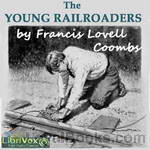 The Young Railroaders
The Young Railroaders
While aimed at youths, this series of tales of the just-opening West makes a rollicking good story for adults, too. Three teen-age boys, trained as telegraphers, manage to get themselves in and out of a wide variety of harrowing circumstances. Using their knowledge of Morse code, the science of telegraphs, and the operation of railroads, the boys stir in native resourcefulness, quick-thinking, and when the occasion demands it, raw courage – to effect rescues, thwart thieves, and solve mysteries. If Tom Swift had lived in the nineteenth century, he could not have had more exciting escapades! | |
By: William Strunk Jr. | |
|---|---|
 The Elements of Style
The Elements of Style
The Elements of Style (1918) by William Strunk, Jr. is an American English writing style guide. It is one of the best-known and most influential prescriptive treatment of English grammar and usage, and often is required reading in U.S. high school and university composition classes. The original 1918 edition of The Elements of Style detailed eight elementary rules of usage, ten elementary principles of composition, “a few matters of form”, and a list of commonly "misused" words and expressions... | |
By: Michael Shaara (1928-1988) | |
|---|---|
 Conquest Over Time
Conquest Over Time
Pat Travis, a spacer renowned for his luck, is suddenly quite out of it. His job is to beat his competitors to sign newly-Contacted human races to commercial contracts...But what can he do when he finds he's on a planet that consults astrology for literally every major decision - and he has arrived on one of the worst-aspected days in history?Michael Shaara, later to write the Pulitzer-winning novel "The Killer Angels", wrote this story for Fantastic Universe in 1956. | |
By: George Gissing | |
|---|---|
 New Grub Street
New Grub Street
The story deals with the literary world that Gissing himself had experienced. Its title refers to the London street, Grub Street, which in the 18th century became synomynous with hack literature; as an institution, Grub Street itself no longer existed in Gissing’s time. Its two central characters are a sharply contrasted pair of writers:Edwin Reardon, a novelist of some talent but limited commercial prospects, and a shy, cerebral man; and Jasper Milvain, a young journalist, hard-working and capable of generosity, but cynical and unscrupulous about writing and its purpose in the modern (i.e. late Victorian) world. | |
 In the Year of Jubilee
In the Year of Jubilee
The Jubilee marks the fiftieth year of the reign of Queen Victoria. Dickensian in its sweeping scope of London life, Jubilee depicts the harsh and disreputable conditions of lower-middle class life at the end of the 19th century. (Introduction by S. Kovalchik) | |
 The Odd Women
The Odd Women
George Gissing's 1893 novel takes on the 19th century "Woman Question" by looking at themes of feminism, marriage, and love. The novel raises these issues through the lives of several contrasting women: Mary Barfoot, a feminist philanthropist who helps train women for careers; her close friend Rhoda Nunn, who believes marriage is a disastrous choice for women; and Monica Madden, who starts out as one of their protegees but chooses to marry a seemingly kind older man. As Monica experiences the challenges of married life, Rhoda finds herself drawn to Mary's cousin, the charming but apparently profligate Everard. | |
 The Paying Guest
The Paying Guest
Clarence and Emmeline Mumford are in for a real treat when they take in the young, outspoken Miss Louise Derrick as their guest. Shedding a light on class struggles in the Victorian era, The Paying Guest offers a look at just what "proper society" expects. | |